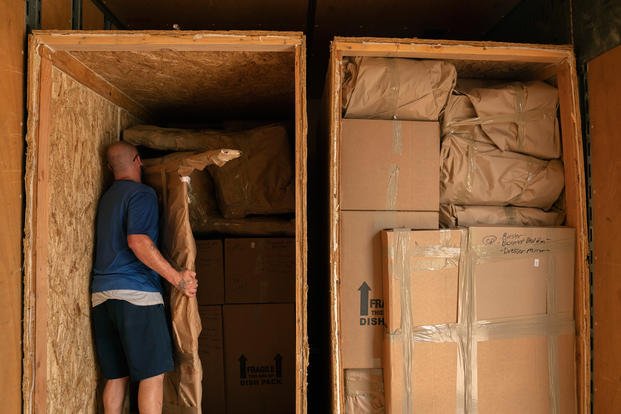Members of the Coast Guard with orders to new duty stations this year will proceed under adaptations that include a longer moving season and restrictions on travel and house-hunting trips, according to a message sent to personnel last week.
Under new guidance from Rear Adm. Joanna Nunan, assistant commandant for human resources, Coasties expecting to move this year are ordered to obtain "without delay, signed orders" and build their moves through Move.mil.
The announcement came while Defense Department personnel remain under a "stop-movement" order enacted March 13 that halted nearly all permanent change-of-station, or PCS, moves and personnel transfers. Those restrictions had been expected to lift May 11. But Defense Secretary Mark Esper said Monday the order will be extended, although he didn't say for how long.
Related: SecDef Announces Plans to Extend Force-Wide Travel Restrictions
U.S. Transportation Command, the DoD organization responsible for shipping troops' household goods, has been directed to process Coast Guard moves on signed orders, according to the message from Nunan, ALCOAST 127/20.
The Coast Guard is the smallest armed service, with an active-duty force of roughly 44,000. While the service declined to say how many of its members were slated for a PCS this year, it has conducted 382 household goods moves since Jan. 1, according to Chief Warrant Officer 4 Barry Lane, a service spokesman.
"Moving forward every two weeks, the CG will assess the risk to continue, pause or cancel certain scheduled PCS moves based on the national landscape," Lane said.
The decision to continue executing Coast Guard PCS orders during the pandemic was made "to maintain a mission-ready posture and advance members' careers," according to Nunan.
"The season will move in a very deliberate, step-by-step process, and can be paused if the national landscape necessitates, which will help ensure members' safety," she wrote.
New this year, Coasties will be required to complete paperwork, known as a PCS Float Plan, involving detailed information such as move dates, travel plans including lodging en route, housing plans and quarantine requirements, if any.
The plans must be signed by the member's departing and arriving commands and will be carried by the member, similar to orders, between duty stations.
"Members will be required to conduct mission planning much like before a flight, a boarding or inspection," Nunan wrote.
Also new are "PCS Assist Teams" that will answer Coasties' questions related to their moves, including orders, setting up and following household goods shipments, medical needs and transportation issues.
The Coast Guard's "Slow the Season" initiative, as it's been dubbed, will rely heavily on increased participation by unit commanders. Nunan has asked service members and commands to work together to determine the optimal time for executing PCS orders from now through September, anticipating gaps in manning or moving separately from their families or at a different time than their furnishings -- a situation that "may be required" in some cases to reduce gaps in mission-critical positions.
According to the guidance, members moving to domestic locations, including Alaska, Hawaii and all U.S. territories, will not be allowed to travel through a foreign country during the PCS, with the exception of Canada for those moving to Alaska.
Leave will not be authorized during transit to a new duty station. Members may request a waiver but, under the guidance, they are expected to take leave before or after their PCS. House-hunting leave will be authorized only once a service member has arrived at their new duty station.
Those with overseas orders will not be considered for moves before May 25, the current date the DoD's stop-movement order for foreign countries is expected to expire.
The guidance applies to PCS departures through May 8. Another situation report will be released April 22 and will address PCS departures through May 22.
Nunan asked that service members and commanders remain flexible throughout the process.
"Timing is critical to successful PCS planning. I urge members and commands to determine the best time for the member and family to transfer in light of ongoing national events while also considering operational demands," she wrote."It might be sooner than you planned, as scheduled, or later."
-- Patricia Kime can be reached at patriciankime@gmail.com. Follow her on Twitter @patriciakime.
Read more: Here's What the Coronavirus Travel Ban Means for Military Families














